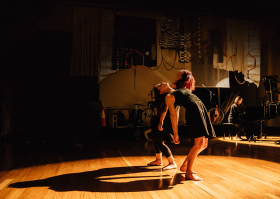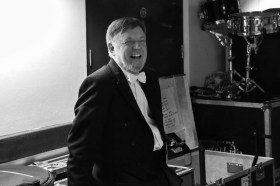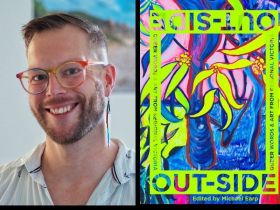Image: shutterstock.com
Filmmakers and performing artists need to be jacks of all trades. The skills to write, direct and produce your own play is something the Academy of Film, Theatre and Television carefully imparts to students studying a Advanced Diploma of Stage and Screen Acting, or Screen and Media – Screenwriting, Directing and Producing.
AFTT theatre teacher, Sean O’Riordan and film teacher Andrew Lawrence offered some tips for ArtsHub readers
Challenge your fear
O’Riordan put on his first comedy show at his local pub, the Harold Park Hotel in Sydney back in 1996. Since then, he has written, directed and produced many of his own plays for theatre company Barestage Theatre. But it was this first show that taught him one important piece of knowledge: it’s not as hard as you think. Don’t be fooled, it’s not exactly easy, but sometimes we build it up in our heads so much that it becomes off-putting for those just starting out when it really should be something exciting to tackle.
‘I learnt a lot about the fear of having to take on the responsibility of coming up with something that people would come to see, but on the other side, the great pleasure and feeling of validation.’ That’s why his advice is to have a go.
‘Go and do it. If there is something inside you that is saying ‘I feel that I need to do this’, then the only thing that is stopping you is a lack of confidence. I think my job, as someone who has done this before, is to bolster student’s confidence as much as possible, because once you’ve done it the first time you realise that it’s a lot easier than you think it is.’
There’s no such thing as writing, only re-writing
‘The biggest challenge out of all of it is writing a good script, I think we’re not spending enough time on the script. Reanalysing it, redrafting it, leaving it alone, coming back to it. We write a script and then run straight out to produce it. But it needs to be reanalysed and made better, you need to do draft after draft,’ said Lawrence.
Lawrence recently returned from a trip to Mexico where he completed the shooting draft of his debut feature film, Sentido. ‘We came back to it and I’ve just made a much better script. I now love it,’ he said.
‘It’s really about re-analysis of your script. Don’t just go with the first idea that comes your way, always reassess your work. In saying that, parts of the script have gone back to some of the original concepts. So when you get advice from someone you take it all in, but you might only listen to some parts of it.’
Read: Why Storytelling is so important as a film-maker
O’Riordan agreed, stating that it all begins with the writing. ‘You have to come up with the source material to begin with so first you have to have something to say in terms of writing it. That process takes care of itself. You spend time just writing, and then once that’s done, you start working on it to perfect it, add detail in it, and turn it into something you’re happy with.’
Don’t cast your mates
‘The producer’s job is also getting the cast together and you have to select the people who will be right for your play, and then organise a rehearsal room and organise the marketing, so that’s again a lot of work and a lot of planning. If you get all the planning right, then the work is not so bad,’ said O’Riordan.
Similarly, Lawrence said that ‘performance is key in a short film’ – the form emerging filmmakers usually begin with.
‘Students are so obsessed with shots and trying to make the “cool shot” – it’s not about that. People will sit through a performance if it’s good, it doesn’t matter about the visuals. But if the visuals are excellent and the performance is terrible they won’t sit through it.’
Lawrence’s other piece of advice is don’t cast your mates. ‘Go for performance. And if your script is good, actors will want to work in it. So then it comes back to script again because actors want to do their trade. Then you can go to agents with a good script.’
Do your research
One of the modules Lawrence teaches at AFTT is Visualising for the screen, which teaches students about style and genre in film. ‘One of the bits of advice I give is that certain styles go for certain films. You don’t necessarily have a style that carries on throughout. I get students to look at film history, and how that has inspired other films of a certain genre.’
Find out more about the Advanced Diploma of Stage and Screen Acting
This helps aspiring filmmakers to identify how their work fits into the history of film to better help them decide on their own style. To make a good short film, you need to watch how the masters have done it before you, he said.
‘The fine arts always look at the masters who have gone before them, but in film we have a tendency to not do that. Because we’ve grown up with films and TV, and we have Netflix going at home twenty-four-seven, we think that’s the style – that’s it. But all the good film makers have been inherently interested in the past. From Tarantino to Scorsese to Kurosawa, they’ve all looked back at the masters and tried to see how it works.’
This kind of research also applies to producing a script for theatre. As O’Riordan says, seeing and reading plays will help build an understanding of what types of plays are being shown, both in your local area and in the rest of the world. This knowledge will help you find opportunities to have your work shown and will give you a realistic idea of where your play might sit in terms of audience and venue.
‘You should compare your piece to see if what you’re writing is something one of these bigger houses might be interested in because you can get your stuff into Belvoir and Griffin. They do have opportunities, even Sydney Theatre Company does, but it’s much tougher. You have to wait until they announce a particular event where they are looking for scripts to be sent in,’ said O’Riordan.
‘The higher up the chain of venues you go, the more and more difficult it is to get them to look at your script let alone to put it on. I would say one of the first places that people could look for in terms of doing the whole auteur thing, is to either go for the Short and Sweet festival in Sydney, or the Sydney Fringe. Both of those organisations are much more open to first time writers and new directors and producers.’
If you are interested in finding out more about the courses on offer at The Academy of Film, Theatre and Television visit http://www.aftt.edu.au/courses
The Essential Skills Series is brought to you in partnership with the Academy of Film, Theatre and Television.





